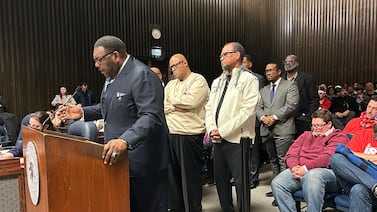Sign up for Chalkbeat New York’s free daily newsletter to get essential news about NYC’s public schools delivered to your inbox.
All 52 companies that run New York City’s yellow school buses signed an emergency 30-day contract with the city Thursday evening, a spokesperson for the companies said.
The last-minute agreement averts a possible work stoppage on Monday, meaning that 150,000 students who rely on school buses are no longer in limbo.
“In the end, this is about the children and our employees, period,” said bus companies’ spokesperson Richard Bamberger.
“This emergency extension will allow us to bring all parties to the table to work everything out, while, at the same time it will allow parents, students, drivers and aides to know that buses will be running on a normal schedule,” he continued.
The five-year contract between the bus companies, the city, and the Department of Education expired in June. Since then, the bus companies have been operating on emergency contracts extended on a monthly basis.
Last week the companies were preparing to halt operations and lay off employees on Nov. 1 if they didn’t receive a five-year contract extension. Schools Chancellor Melissa Aviles-Ramos and others had concerns about approving a contract that would outlast the incoming mayor’s first term.
The city spent nearly $2 billion on school busing last year, a sprawling system rife with problems, including delayed and no-show buses, unnecessarily long commute times for students, and lack of air conditioning. Simply renewing the existing contracts curtails the city’s ability to negotiate better outcomes, officials have said.
As of Wednesday night, 27 of the 52 bus companies had agreed to extend the contracts for November and December, Aviles-Ramos said during the meeting of the Panel for Education Policy, the school board that approves the contracts.
Four of the largest bus companies, Logan, Consolidated Transit, Pioneer, and First had not signed the emergency contracts by that point, according to a source familiar with the agreement.
The latest agreement eases the tension for parents, some of whom tearfully shared Wednesday night that they need bus service for their children.
“This service is far more than a convenience. It is a vital part of our daily lives, ensuring our children arrive at school safely, consistently, and on time,” said parent Denise Martinez.
Panel members unanimously voted Wednesday on a resolution opposing a five-year contract for the bus companies, saying that it lacked vendor accountability and better services. The contract is due for a vote before the panel on Nov. 19.
At the meeting, hundreds of bus drivers roared “five more years,” demanding to extend the contract.
After the panel rejected the five-year plan, the companies were left with two choices: continue on a monthly, emergency contract basis or layoff drivers and stop bus services.
Ultimately, the companies signed the emergency, 30-day extension Thursday evening.
“We have serious concerns about the entire process, but we want and need to work with the PEP,” Bamberger said.
He said the companies look forward to finalizing the contract at the Nov. 19 panel meeting.
Parents and panel members still have concerns as well.
“Please understand we’re here for you, your kids, your job, your livelihood,” said panel member Rima Izquierdo to the bus drivers during the meeting. “We support you. You all need to support us too. [The companies] are making money on all of us, and it is not fair.”
Izquierdo has been a vocal critic of the bus companies, raising awareness of the sweltering conditions on buses in the heat and fighting to improve commute times. She believes the city should work out a better deal with the companies that could improve service for children.
“Bus staff, they’re underpaid, they’re overstaffed, they’re overworked. This is not working. The status quo is not working,” said Maggie Sanchez, a member of the Citywide Council on Special Education, speaking against the current contracts.
Wednesday night’s resolution also called on the city to rebid or contract with new bus companies. The city, however, won’t be able to make a deal without offering an Employee Protection Provision, or EPP, a protection that guarantees laid off unionized bus workers are prioritized for hiring by other companies at their current wages.
A 2011 state court decision prevents EPP from being inserted into new contracts — it can only exist in extended contracts. That’s why advocates like Sanchez were against the five-year contracts. She, along with the panel members, want to convince the state to sign bills that allow EPP in the rebidding process.
“It would allow the city to move forward with its new bus contracts while keeping current job protections in place,” Sanchez said about passing the resolution that rejects the five-year extension.
Chalkbeat New York reporter Michael Elsen-Rooney contributed.
Ananya Chetia is an intern at Chalkbeat NY. Contact Ananya at achetia@chalkbeat.org.





